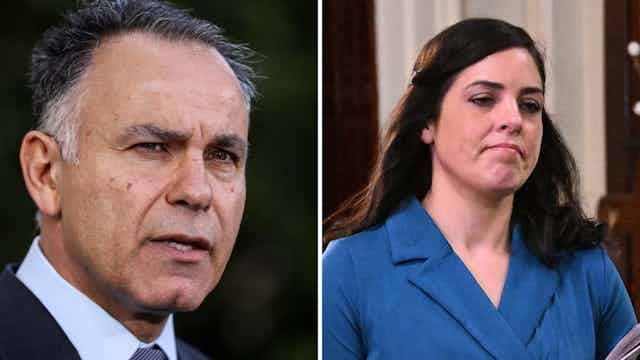The crisis consuming the Victorian branch of the Liberal Party sounds a warning to centre-right parties that pursuing the culture wars now gripping the United States and other countries brings dangerous volatility. And little public support.
After it was humiliated at the November 2022 election by a long-term Labor government beset with its own failings and character questions, the state division in the nation’s second-most populous state is regarded as a basket case.
The future of its moderate parliamentary leader, John Pesutto, who took over from the hapless Matthew Guy, now hangs in the balance.
A cabal of religious and hardline social conservatives in Pesutto’s party room is defying his attempts to shift the party closer to mainstream voter sentiment on key social policy debates.
Read more: Victorian Liberals embarrassed by extremists within: how does this keep happening?
With the stoush dominating the headlines – even beyond Victoria – a clearly frustrated federal leader Peter Dutton has pointedly refused to rule out federal intervention to clean up the mess, which he says is harming the Liberal “brand” and letting the Andrews Labor government off lightly.
It is far from clear that a federal intervention is even practical. But Dutton’s comments represent a significant escalation in a crisis that seems increasingly likely to end up in the courts.
Pesutto’s removal is also now more likely given that several Liberals in his depleted caucus have backed rebel MP Moira Deeming.
Deeming is challenging her suspension from the party following her attendance at an anti-trans “Let Women Speak” rally in front of Parliament House. The event attracted extremists, including neo-Nazis.
Read more: Australian conservatism succumbs to the same radical tendency as like-minded parties abroad
The outspoken MP has reportedly instructed lawyers to challenge a party-room ruling that she would not be expelled from the party – as Pesutto initially proposed – but would instead serve a nine-month suspension, during which she would sit on the crossbench.
Deeming says the compromise decision included Pesutto explicitly stating publicly that she was in no way a Nazi sympathiser, which she says he has not done.
Deeming’s supporters, who met at a country hotel last weekend and then used social media to advertise the fact, say she has been treated abysmally.
Amid the chaos, minutes of the March 27 party-room meeting show tempers were high. In the meeting, Pesutto was warned by senior figures against taking steps towards Deeming’s expulsion.
Deeming claims she has been effectively tagged with Nazi sympathies via a dossier circulated at the meeting. This is said to have linked the British social agitator Kellie-Jay Keen, who goes also by the name of Posie Parker, with fanatical authoritarians.
Pesutto denies anything in the dossier established Deeming herself as “a Nazi or having Nazi sympathies”.
Nevertheless, the unseemly public struggle for the soul of the Victorian Liberal Party has again drawn attention to the type of candidates chosen by local rank-and-file branch members. There are claims of “entryism” – an insidious form of political party infiltration whereby hardline forces, often associated with rightwing Pentecostal faith communities, join local party branches en masse to install like-minded candidates in winnable Liberal seats.
Liberal insiders say Dutton’s threat of federal intervention may be hard to deliver. Unlike the Australian Labor Party – which has a strong national structure – the Liberal Party is set up on federated lines, with each state division jealously guarding its own autonomy.
Read more: Dutton's high-wire act: holding the Coalition together while presenting as an alternative government
However, federal interventions have occurred in the past. One example was last year when, just before the federal election, a special committee featuring then prime minister Scott Morrison, then NSW premier Dominic Perrottet, and former party president Chris McDiven was empowered to crash through factional roadblocks to endorse candidates in several Liberal-held seats.
Sources say gaining support for such extraordinary powers is not straightforward. It would need to achieve a super-majority of the party’s federal executive – a three-quarters majority in favour of federal intervention in a state’s affairs. It may also require the backing of the Victorian state president.
Party insiders say such actions are inimical to Liberal Party philosophy and would only be granted in extreme circumstances, based on the narrowest of parameters and a short time frame.
The intervention itself would also be likely to end up in court, with opponents challenging its legality and the force of its decisions.
In any event, courts have shown reluctance to adjudicate on internal political party disputes, generally regarding them as matters for the parties and individuals involved.
The Victorian Liberals’ problems are merely the latest example of a tendency in conservative politics to prosecute niche or peripheral social policy campaigns against advances in Indigenous rights, gender fluidity and identity, feminism, sexuality, and birth control.
Given Dutton’s own antagonism for what his party dismissively describes as “wokeism” and “corporate activism” on the Voice and other questions, moderates may view his threat of federal intervention as an attempt to press Pesutto and other moderates into backing down by readmitting Deeming to the party room.
But after his own party’s performance in the federal Aston byelection, in which the Liberals surrendered a seat to a Labor government for the first time in more than 100 years, Dutton’s cache in the state is questionable.

